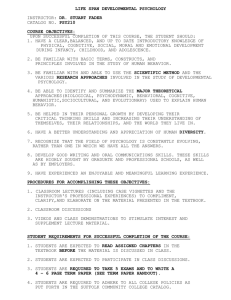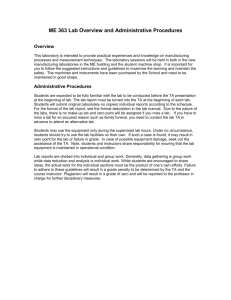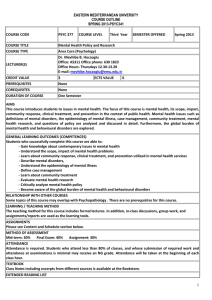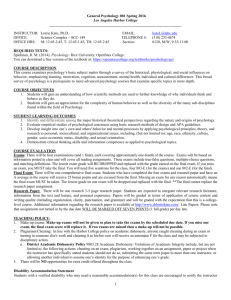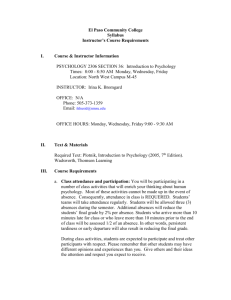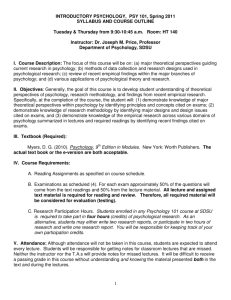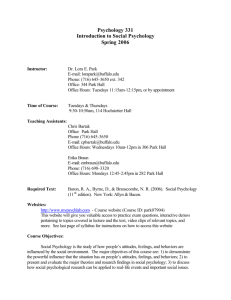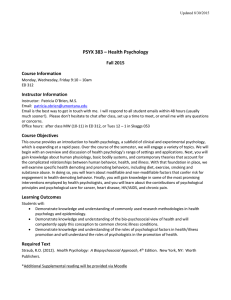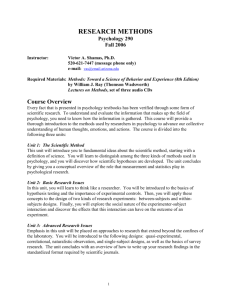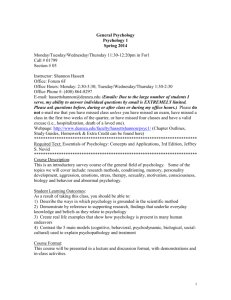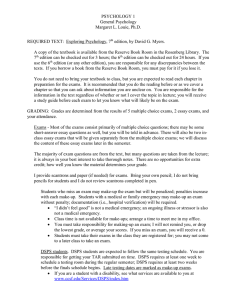PY 102 Gen. Psychology - TR 12:30
advertisement
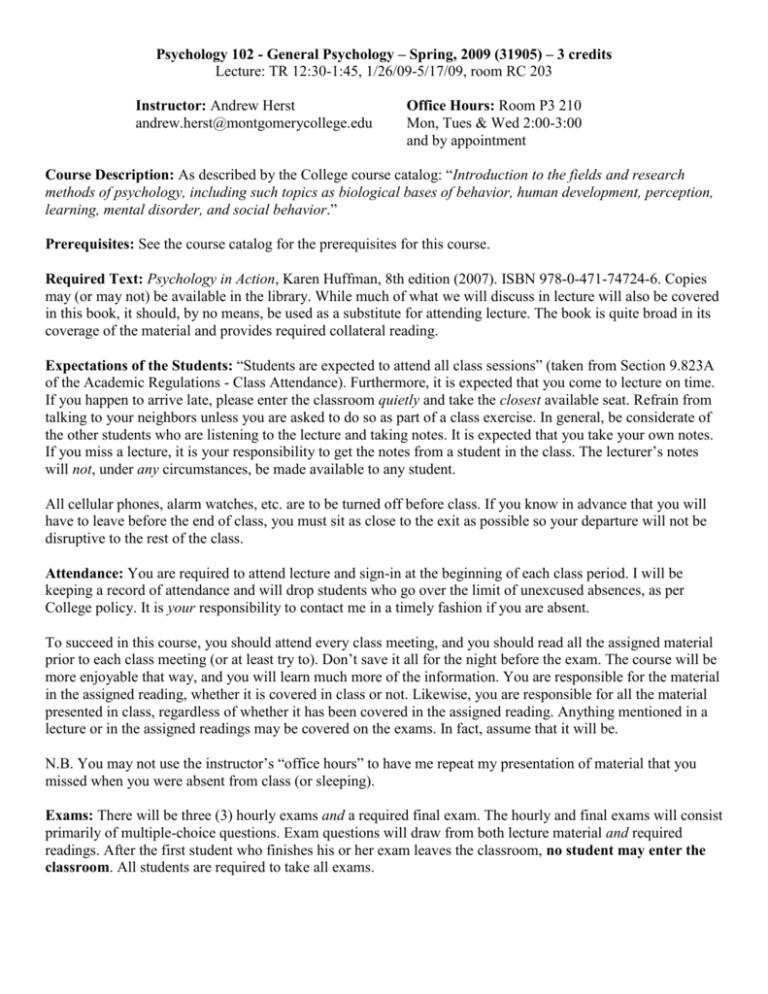
Psychology 102 - General Psychology – Spring, 2009 (31905) – 3 credits Lecture: TR 12:30-1:45, 1/26/09-5/17/09, room RC 203 Instructor: Andrew Herst andrew.herst@montgomerycollege.edu Office Hours: Room P3 210 Mon, Tues & Wed 2:00-3:00 and by appointment Course Description: As described by the College course catalog: “Introduction to the fields and research methods of psychology, including such topics as biological bases of behavior, human development, perception, learning, mental disorder, and social behavior.” Prerequisites: See the course catalog for the prerequisites for this course. Required Text: Psychology in Action, Karen Huffman, 8th edition (2007). ISBN 978-0-471-74724-6. Copies may (or may not) be available in the library. While much of what we will discuss in lecture will also be covered in this book, it should, by no means, be used as a substitute for attending lecture. The book is quite broad in its coverage of the material and provides required collateral reading. Expectations of the Students: “Students are expected to attend all class sessions” (taken from Section 9.823A of the Academic Regulations - Class Attendance). Furthermore, it is expected that you come to lecture on time. If you happen to arrive late, please enter the classroom quietly and take the closest available seat. Refrain from talking to your neighbors unless you are asked to do so as part of a class exercise. In general, be considerate of the other students who are listening to the lecture and taking notes. It is expected that you take your own notes. If you miss a lecture, it is your responsibility to get the notes from a student in the class. The lecturer’s notes will not, under any circumstances, be made available to any student. All cellular phones, alarm watches, etc. are to be turned off before class. If you know in advance that you will have to leave before the end of class, you must sit as close to the exit as possible so your departure will not be disruptive to the rest of the class. Attendance: You are required to attend lecture and sign-in at the beginning of each class period. I will be keeping a record of attendance and will drop students who go over the limit of unexcused absences, as per College policy. It is your responsibility to contact me in a timely fashion if you are absent. To succeed in this course, you should attend every class meeting, and you should read all the assigned material prior to each class meeting (or at least try to). Don’t save it all for the night before the exam. The course will be more enjoyable that way, and you will learn much more of the information. You are responsible for the material in the assigned reading, whether it is covered in class or not. Likewise, you are responsible for all the material presented in class, regardless of whether it has been covered in the assigned reading. Anything mentioned in a lecture or in the assigned readings may be covered on the exams. In fact, assume that it will be. N.B. You may not use the instructor’s “office hours” to have me repeat my presentation of material that you missed when you were absent from class (or sleeping). Exams: There will be three (3) hourly exams and a required final exam. The hourly and final exams will consist primarily of multiple-choice questions. Exam questions will draw from both lecture material and required readings. After the first student who finishes his or her exam leaves the classroom, no student may enter the classroom. All students are required to take all exams. Grading Policy: Exam scores will be standardized to the performance-level of the class by setting the average score of the three highest exam scores = 100%. For example, if the three highest exam scores are 40, 42 and 44, a score of 42 = 100%. Thus, a student with 35 correct would have an exam score of 83.3%, rounded up to 84%. Absences: If you miss an exam because of an excused absence (which includes illness, religious observance, participation in College activities at the request of College authorities, or compelling circumstances beyond the student’s control), then you must provide documentary support of the absence within one (1) class session upon returning, otherwise you will receive a grade of zero. In order to qualify for a make-up examination, you must provide the instructor with a typewritten explanation and a copy of whatever documentation you have for the excused absence. Your request must include your name, SID number, the exam missed, and the dates absent. Make-up Exams: If you miss an exam because of an excused absence, and you provide the appropriate documentation in a timely fashion, then you will qualify to take a make-up exam. The make-up exams will be short answer/essay format and cover the same material that would have been on the regularly scheduled exam. It will be given in the testing center. It is fully the responsibility of the student to schedule a time to take the exam within the period allotted by the instructor (usually 2 weeks from return of absence). Other Assignments: Throughout the semester, there will be various projects and/or assignments. The due dates and guidelines for these assignments will be given out later. Course Goals: At the conclusion of this course, the student should: 1. understand, and be able to communicate, basic ideas in scientific psychology in a meaningful way (i.e., by using basic terms of the discipline) 2. appreciate the fallacies of intuition and casual observation 3. understand some basics of social science methodology, including: alternative explanations for a correlation; the importance of experiments for determining causality; and the critical components of a true experiment 4. understand the reasoning processes used by psychologists to arrive at particular conclusions regarding human behavior 5. understand that nature and nurture interact to determine many human psychological characteristics 6. be familiar with several of the basic areas of application of psychological knowledge 7. be well informed about several of the basic theories of scientific psychology (i.e., what they are about, what they profess to explain, and how the “work”) 8. have a rudimentary understanding of human behavior and the influences that contribute to the unique development of each individual 9. understand the fundamentals of neuronal transmission and how is relates to mental life 10. understand that sensory and perceptual processes are influenced in ways that make experiences an inaccurate representation of reality 11. understand the fundamentals of classical and operant conditioning 12. understand the basics of the information-processing approach to memory 13. understand that memories are constructed, subject to errors during encoding and retrieval 14. understand the power of the situation to influence behavior 15. be aware of the psychological processes that influence the student’s own behavior Student E-mail: http://www.montgomerycollege.edu/mymc/email_faq/student.html Inclement Weather: On days when the weather is questionable and you think we may not have lecture, first check the College web site, then with local television and radio stations, as to the status of lecture. Do not base judgment on the conditions around your home. Unless you hear otherwise, lecture will be held. Helpful Hints for Doing Well: Ask questions if you do not understand any aspect of the material. Ask these questions before, during, and after lecture. Ask them in office hours and ask them by e-mail. If you have a question, it is absolutely certain that other students have the same question. Having the point clarified will not only help you, but will help the entire class as well. If you wait until shortly before an exam to have concepts clarified, it may be too late to remedy matters because lectures usually build upon each other. If you miss a concept in an earlier lecture, you may not be able to make the connections between concepts. In addition, attend all lectures. As mentioned above, the lecturer’s notes will not be made available to students. One technique employed by many students who do well in school is to organize your notes immediately after lecture and formulate questions to be asked next time lecture meets. Course Outline: Date of Exams Exam #1 – Tuesday, February 24 Exam #2 – Thursday, March 26 Exam #3 – Thursday, April 16 Final Exam – Tuesday, May 12, 12:30-2:30 Chapters and Topics Covered 1 – Introduction and Research Methods 2 – Neuroscience and Biological Foundations 5 – Consciousness 4 – Sensation and Perception 6 – Learning 7 – Memory 8 – Thinking, Language and Intelligence 12 – Motivation and Emotion 9 & 10 – Lifespan Development I & II 3 – Stress and Health Psychology 11 – Gender and Human Sexuality 13 – Personality 14 – Psychological Disorders 15 – Therapy 16 – Social Psychology The above schedule is subject to, and probably will, change. Our schedule may be modified based upon our progression through material. If, for whatever reason, an exam is not given, it will be rescheduled for the very next class period. NOTE: Spring Recess – March 16-20 – No Lecture/Classes NOTE: Last regularly scheduled lecture of the semester is Friday, May 8. The final exams begin after that.
